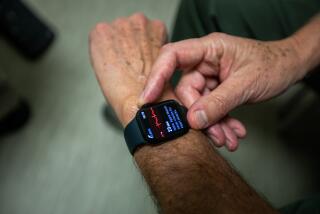TECHNOLOGY : Hitachi, Motorola Fight Ends; Apple’s the Loser
- Share via
A hard-hitting court battle over patent rights between rival semiconductor makers Hitachi Ltd. and Motorola ended Thursday with a federal judge ruling against both sides.
However, in a strange twist, the biggest loser in the case could be Apple Computer, whose Macintosh product line depends heavily on one of the chips affected by the legal proceedings.
In his decision, U.S. District Judge Lucius Bunton ruled in Austin, Tex., that both companies had infringed on the other’s patent and ordered both to pay damages as well stop selling chips based on the offending patents. Representatives of the two companies could not be reached for comment.
Under Bunton’s order, Hitachi will pay $1.9 million to Motorola for infringement of Motorola patents in the Japanese firm’s H8 chip, and Motorola will pay $500,000 to Hitachi for infringing on Hitachi patents in the American firm’s 68030 microprocessor.
However, despite the imbalance of payments, the decision could be far more damaging to Motorola, which, analysts said, takes in about $100 million in annual sales from the 68030. It could also hurt Motorola’s customers, including Apple and Sun Microsystems, which depend on the microprocessor to control some of their machines.
The 68030 chip is the microprocessor used in all but two Macintoshes built by Apple. An Apple spokeswoman said the company is confident that Motorola and Hitachi would resolve their differences before Apple’s inventory of the microprocessor is depleted.
Although she declined to reveal Apple’s inventory of the microprocessor, she noted that the company is noted for keeping its stockpile of supplies low so that it can receive shipments just as they are needed.
A Sun spokeswoman said two of its products use the Motorola chip. She added that the company has not yet evaluated the ruling to determine its potential effect.
Michael Slater, editor of the Microprocessor Report in Palo Alto, predicted that the judge’s ruling would prompt both sides to quickly seek a cross-licensing agreement covering both chips. Slater said such an agreement would be indispensable, especially to Motorola.
“There is no way Motorola can allow this ruling to stand as it is. They have to convince Hitachi to license them the technology for that chip,” Slater said.
The ruling capped a yearlong suit and countersuit battle between the companies that had at one time been technological, manufacturing and marketing allies.
The legal proceedings started in January, 1989, when Motorola, based in Schaumburg, Ill., sued Tokyo-based Hitachi, claiming that the Japanese company was using Motorola secrets in development of a series of micro controllers--thumb-sized devices central to information-processing devices used in computers. The micro controllers were designed and manufactured in Austin.
Hitachi filed a countersuit, claiming Motorola infringed on some of Hitachi’s patents. At issue was a 1986 cross-licensing agreement between the two companies that allowed each to use some of the other’s patents.
In his ruling, Bunton said neither company was licensed to use the other’s patents under the 1986 agreement.






